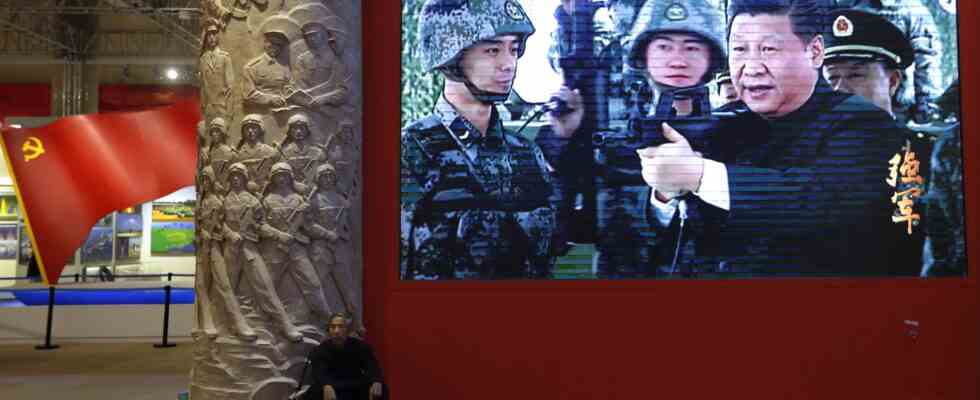analysis
Status: 03.11.2022 8:18 p.m
“Hide your strength and wait until your time comes,” has long been the motto for China’s appearance in the world. Times have changed under Xi’s leadership: diplomats and politicians are expressing themselves more and more aggressively.
The film scene should get under your skin. An imaginary country in Africa lies in ruins. people are in a panic. But then rescue comes: A soldier from the Chinese People’s Liberation Army hoists his national flag, the music becomes emotional, the opponents throw down their weapons, everyone cheers. China’s army as liberators, as saviors. The slogan of the film “Wolf Warriors 2” was: “Even a thousand miles away – whoever attacks China will pay for it.” The 2017 film broke records in China – and its title gave a name to the new style of Chinese diplomats: wolf warriors.
The so-called wolf warriors appear aggressively in interviews and on social networks, defending Chinese views with nationalistic undertones or even threatening their host country. For example, the Chinese ambassador to Sweden, Gui Congyou. He said on Swedish television: “We treat our friends with fine wine, but we have shotguns for our enemies” when asked about the fact that Swedish writer and publisher Gui Minhai, who is being held in China on questionable espionage charges, was in Sweden was awarded the Tucholsky Prize.
The list of “wolf warrior” diplomats is long. Chinese foreign ministry spokesmen stand out in particular: former spokesman Zhao Lijian circulated on his Twitter account a digitally manipulated image of a child having his throat cut by an Australian soldier. The current Foreign Ministry spokeswoman Mao Ning repeatedly agitates against the USA.
Movie posters for the 2017 Chinese cinema film “Wolf Warriors 2”.
Image: picture alliance / Yi Chang/HPIC
China’s “Machiavelli Moment”
The new strategy goes back in large part to the new leader Xi Jinping. “When Xi took office, he doubled the budget for the Foreign Ministry and asked the diplomats to act differently,” explains May-Britt Stumbaum, a China expert at the Bundeswehr University in Munich. In the years before Xi took office, China’s economic power had increased enormously. At the same time, the West had stumbled as a result of the financial crisis in 2008/2009 and the euro crisis in 2012. “The so-called Machiavelli moment in China followed in 2018, when it was decided: “It’s better to be feared than loved,” says May-Britt Stumbaum.
China’s foreign ministry changed diplomats’ performance assessments, adding “public relations,” writes Dylan MH Loh of Singapore’s Nanyang University. Assertive diplomacy, which used to take place behind the scenes, is now clearly visible in the public eye. This incentive is one of the main reasons for the recent spate of Twitter appearances and activities by Chinese diplomats, writes Loh.
The end of restraint
The changed outward appearance is also for the national audience in China, explains Professor Wang Yiwei from the renowned Renmin University in Beijing. “Chinese people’s views of the world have changed. The young generations who grew up during the opening-up reforms are more confident. So they like the idea that the foreign ministry spokesman and diplomats are more active.” However, Wang Yiwei describes the term “wolf warrior” as discriminatory: “People should not be referred to as animals. In addition, the wolf does not have a positive connotation in Chinese culture.”
Chinese diplomats are more active, they are smart and courageous, but that doesn’t mean “aggressive,” says Wang. “We used to hold back, we were very tolerant and didn’t react when bad things were said about China. Now we’ve been accused of genocide in Xinjiang, for example, and we put it right, defend ourselves and explain our position to the world.”
Almost two years ago, the Communist Party newspaper “Global Times” wrote that foreign countries are responsible for China’s harsh tone in diplomacy. Western countries have taken a tough diplomatic stance toward China on some issues, most notably “the so-called human rights issues in Xinjiang,” the party newspaper said. The article goes on to ask, “In the face of deliberate Western provocations, baseless accusations against China, and constant exaggeration that China’s rise poses a threat to the world, how can China not become a wolf warrior?” The newspaper “Global Times” is known for its aggressive attitude. Accordingly, the article ends with the unforgiving sentence: “Of course, China will not make any compromises and will fight back like a real warrior.”
“Tian Tian”, “Himmelchen” and “Bao Bao”, “Schätzchen” were the names of the first two pandas that China sent to Berlin in the 1980s.
Image: picture alliance / Giehr/dpa
“Time when China wanted to be loved”
Xi Jinping propagates China’s rise to global power. For a long time, China’s government was reluctant to make such statements. “Hide your power and wait until your time comes,” was the philosophy of longtime leader Deng Xiaoping. During his reform and opening-up policies in the 1980s and 1990s, he brought China back onto the world stage after the Cultural Revolution. But Deng tried to give China a low-key image. “Official documents shouldn’t be written about ‘China’s rise’. That was seen as too aggressive. Instead, it was called ‘China’s development’,” explains the expert Stumbaum.
During this time, so-called panda diplomacy was promoted: China lent states the animals for their zoos as a sign of friendship. Tiantian (“Heaven”) and Baobao (“Sweetheart”) were the names of the first pandas that China sent to Germany in 1980 – two nicknames for children. “That was the time when China wanted to be loved,” says Stumbaum. But even then it was clear that China wanted to regain its place as the “Middle Kingdom” – only when the government saw the time came.

